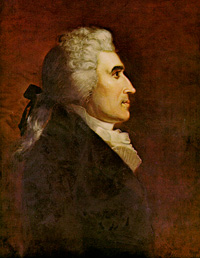
Back جوناثان دايتون Arabic جوناثان دايتون ARZ جاناتان دیتون AZB Jonathan Dayton Danish Jonathan Dayton (Politiker) German Jonathan Dayton Spanish جاناتان دیتون Persian Jonathan Dayton (homme politique) French ג'ונתן דייטון HE Jonathan Dayton Hungarian
Jonathan Dayton | |
|---|---|
 | |
| 3rd Speaker of the United States House of Representatives | |
| In office December 7, 1795 – March 3, 1799 | |
| Preceded by | Frederick Muhlenberg |
| Succeeded by | Theodore Sedgwick |
| United States Senator from New Jersey | |
| In office March 4, 1799 – March 3, 1805 | |
| Preceded by | Richard Stockton |
| Succeeded by | Aaron Kitchell |
| Member of the U.S. House of Representatives from New Jersey's at-large district | |
| In office March 4, 1791 – March 3, 1799 | |
| Preceded by | James Schureman Elias Boudinot |
| Succeeded by | Mark Thomson John Condit |
| Delegate from New Jersey to the Congress of the Confederation | |
| In office 1787–1788 | |
| Personal details | |
| Born | October 16, 1760 Elizabethtown, Province of New Jersey, British America |
| Died | October 9, 1824 (aged 63) Elizabethtown, New Jersey, U.S. |
| Political party | Federalist |
| Other political affiliations | Pro-Administration |
| Spouse | Susan Williamson |
| Parent | Elias Dayton (father) |
| Relatives | George Dayton (great-grandson) |
| Alma mater | College of New Jersey |
| Profession | Lawyer |
| Signature | |
Jonathan Dayton (October 16, 1760 – October 9, 1824) was an American Founding Father and politician from New Jersey. At 26, he was the youngest person to sign the Constitution of the United States. He was elected to the United States House of Representatives in 1791 and later served from 1795 to 1799 as its third Speaker. He left the House in 1799 after being elected to the U.S. Senate, where he served one term. Dayton was arrested in 1807 for alleged treason in connection with Aaron Burr's conspiracy to establish an independent country in the Southwestern United States and parts of Mexico. He was exonerated by a grand jury,[1] but his national political career never recovered.